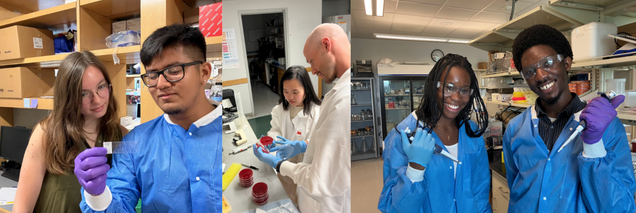Research Opportunities

In most cases summer scholars will work under the guidance of a faculty mentor from one of the following research areas within Boston University’s School of Medicine and School of Public Health:
Anatomy and Neurobiology
Biochemistry
Biostatistics
We are actively engaged in a variety of methodological and collaborative research. Through the methodological research, our faculty identify and solve statistical problems and improve current practice in biomedical research. In collaborative research, our faculty are involved in study design and properly analyzing and interpreting data from clinical trials or observations studies.
Cardiovascular Medicine
We specialize in clinical, basic & translational research and population science & epidemiology in a variety of cardiovascular specialties.
Computational Biomedicine
Our focus is on translational research to better understand lung biology and disease using post-genomic technologies and computational tools. The long terms goals of our lab are two fold. On the one hand, we seek to leverage these approaches to improve the diagnosis, treatment, and prevention of lung disease. On the other hand, we seek to develop and apply new research approaches and to train physician-scientists and graduate students who can apply these tools in the setting of translational research.
Endocrine, Diabetes, Nutrition & Weight Management
Endocrine, Diabetes, Nutrition & Weight Management
Our team values interdisciplinary collaborations in a broad range of areas including diabetes, nutrition & metabolism, endocrinology and obesity. Current and previous collaborators include experts in cardiology, microbiology, immunometabolism, gastroenterology, cancer, physiology/biophysics, clinical epidemiology, preventive medicine, obstetrics, and minimally invasive bariatric surgery.
Environmental Health
Our work spans epidemiology, exposure science, toxicology, and risk assessment, and generally falls into one of four thematic areas:
- Exposure to complex mixtures and health across the life course: where we live, work, and play
- Translating environmental health to action through policy-relevant research
- Community-based environmental health: Addressing issues of environmental justice in collaboration with vulnerable populations
- Interdisciplinary research connecting basic and applied environmental health science
Epidemiology
Studies include Health Decline in Aged Caregivers, Investigating Breast Cancer and the Environment on Cape Cod, Long-term Follow-up of Individuals Exposed to Diethylstilbestrol, Neurotoxic Effects of PCE Exposure During Gestation and Childhood, Prostate Cancer Screening and Biomarkers, Internet-based Study of Time to Pregnancy, Mental Health in the Army and National Guard, Folic Acid “Resistant” Spina Bifida, Tuberculosis Clinical Trials and Epidemiologic Studies, the Black Women’s Health Study, Structural and Network Risk Factors in HIV and Substance Users, Reducing Tobacco Use and Secondhand Smoke Exposure in Public Housing, and the Framingham Heart Study.
Gastroenterology
Our goal is to study human biology in normal and disease states, through the use of stem cells in general and pluripotent stem cells in particular, with two major focuses: gastrointestinal tract and immunity/inflammation.
Genetics and Genomics
General Internal Medicine
Research focus is on disease prevention and improving wellness through projects ranging from treating addiction to improving women’s health.
Infectious Diseases
The Section of Infectious Diseases (ID) represents a dynamic and collaborative research group with demonstrated strengths in both basic and clinical research in areas such as bacterial pathogenesis, HIV, parasitology, host-pathogen interactions, vaccines, and innate immunity.
Immunology Training Program
We focus our research on adaptive immunity, innate immunity and inflammation, autoimmunity, cancer immunology and immunotherapy, microbial and viral immunology.
Microbiology
We focus our research on the molecular mechanisms underlying microbial infection and the host immune response with areas of research including bacterial genetics, virus molecular biology, parasitology, host-pathogen interactions and immunology.
Molecular Medicine
We use molecular techniques to address basic, clinical and translational questions to address mechanisms of disease.
Nutrition and Metabolism
We focus on nutritional and metabolic aspects of chronic diseases from a multidisciplinary perspective that encompasses molecular, biochemical, physiological, clinical, epidemiologic aspects of human nutrition.
Pathology & Laboratory Medicine
Pathology & Laboratory Medicine
We utilize experimental and applied pathology to gain a better understanding of disease processes while working to develop methods for diagnosis, prevention and treatment of diseases including cancer and neurological disorders.
Pharmacology, Physiology & Biophysics
Pharmacology, Physiology & Biophysics
Our primary faculty have diverse biomedical research interests and apply a wide-range of technologies in their Boston University Chobanian & Avedisian School of Medicine laboratories. The focus areas of our current Biomedical research encompass many facets of Pharmacology, Physiology, and Biophysics
Pulmonary
Research in the Pulmonary Center is elucidating the biology of healthy lungs, discovering mechanisms responsible for pulmonary disease, analyzing the efficacy and limitations of current pulmonary and critical care practices, and translating these findings to yield clinical advances.
Pulmonary, Allergy, Sleep, and Critical Care Medicine
Pulmonary, Allergy, Sleep, and Critical Care Medicine
Research in the Pulmonary Center is elucidating the biology of healthy lungs, discovering mechanisms responsible for pulmonary disease, analyzing the efficacy and limitations of current pulmonary and critical care practices, and translating these findings to yield clinical advances.
Vascular Biology
Faculty mentors are experts in a variety of fields of cardiovascular biology that support trainees in pursuing independent projects.
For more clinical science departments at BUSM, visit: www.bumc.bu.edu/busm/research/clinical-science-departments/.
